Light – Review
by Ric
|
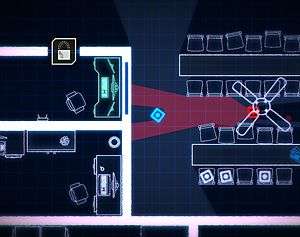 A lot can change over the development cycle of a game. Ideas that seemed great at the start can be removed when it turns out they’re not fun or interesting. Stories are written and re-written, graphics alter drastically, and entire portions of a game can be cut out mere weeks before it ships. We, the public, may never see this occur, though I think I’ve found a pretty good example. Light, the debut game from Just A Pixel, started life on Kickstarter, and impressed with its minimal art style, focus on light as a gameplay feature, and numerous interesting stealth mechanics and level ideas. Within a few weeks, the Kickstarter was taken down, as the game had received funding from “a private party”, since revealed to be Team17, who are now acting as Light‘s publishers. And with that major change came so many more.
A lot can change over the development cycle of a game. Ideas that seemed great at the start can be removed when it turns out they’re not fun or interesting. Stories are written and re-written, graphics alter drastically, and entire portions of a game can be cut out mere weeks before it ships. We, the public, may never see this occur, though I think I’ve found a pretty good example. Light, the debut game from Just A Pixel, started life on Kickstarter, and impressed with its minimal art style, focus on light as a gameplay feature, and numerous interesting stealth mechanics and level ideas. Within a few weeks, the Kickstarter was taken down, as the game had received funding from “a private party”, since revealed to be Team17, who are now acting as Light‘s publishers. And with that major change came so many more.
Light begins with you, a blue square, waking up in a strange location with no memories, and deciding to break out of the building… just because. From there you become embroiled in a grand conspiracy, slowly piecing together your memories and working out what happened to you before and what you must do now. It’s hard to talk about the story without giving anything away, especially since you start the game with absolutely no idea what’s going on; you’re simply dropped into the game and told to follow objectives. It’s a bit of a harsh opening, but it does mean that you learn about what’s going on at the same time as your character, which is an interesting way to play things.
The problem is that the story isn’t particularly engaging. You’re forced to pick up intel that reveals more about the world and the people in it but, more often than not, I skimmed the text and moved on. It’s the same old “mega-corporation performs evil act” storyline that’s been told a thousand times before in sci-fi, and what few twists there are present are so flatly delivered that it’ll take a few minutes for it to register in your brain that anything happened. The worst part is that because of how integrated into the game the story is, you can’t even avoid it in favour of the gameplay, which is actually where the game really shines.
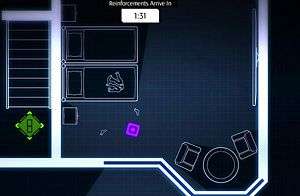 The stealth mechanics rely purely on sight, with guards and cameras having huge cones of vision that must be avoided at all costs. Cameras take a few seconds to notice you before they trigger an alarm, whereas guards will shoot on sight and chase you if you run away, rarely giving up before they get the chance to kill you. You can reduce their field-of-vision by killing a civilian and disguising yourself, Hitman style, but doing so reduces your score and usually leads to reinforcements being called in exactly two minutes later, resulting in almost certain death. To get the best score, you must rely on learning the guards’ patterns, moving at exactly the right time, and learning the best places to hide.
The stealth mechanics rely purely on sight, with guards and cameras having huge cones of vision that must be avoided at all costs. Cameras take a few seconds to notice you before they trigger an alarm, whereas guards will shoot on sight and chase you if you run away, rarely giving up before they get the chance to kill you. You can reduce their field-of-vision by killing a civilian and disguising yourself, Hitman style, but doing so reduces your score and usually leads to reinforcements being called in exactly two minutes later, resulting in almost certain death. To get the best score, you must rely on learning the guards’ patterns, moving at exactly the right time, and learning the best places to hide.
It’s a good thing the game handles so well, because a split-second mistake can spell disaster. This is largely down to the minimalist art style; there are no animation loops to run, so your square just glides along the floor. You can also use the “peek” feature to stand in one place and look ahead to keep and eye on the guards and plan your route accordingly. Picking up items and performing other actions are assigned to one of four keys, and the reaction is instant, meaning you can glide past an item, hit E, press Space to skip the boring story, and keep on moving. It’s fast-paced and filled with tension, and makes repeating levels to get a higher score that bit more enjoyable.
Aside from sneaking around avoiding guards, you’re also tasked with hacking computers. This simply involves holding the E key while stood next to a terminal, then hitting Q to enter hacking mode. This mode pauses the game and lists hackable objects, which will consist of opening doors or turning off cameras. Opening doors is essential, since most of the exits are hidden behind locked doors, but turning off cameras is also very handy if you want to make things easier on yourself. It’s a very simple feature, but one that helps to break the game up from simply being a case of “run from A to B”.
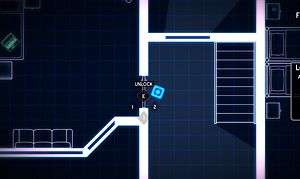 Even with the fun gameplay and smooth controls, however, the story is so deeply embedded that it very nearly ruins everything. Every level requires you to pick up intel, which pauses the game as an encouragement for you to read it and learn something new, but it just breaks the flow. The intel isn’t stored anywhere, so if you’re at all interested in reading it, you’ve got to read it there and then or lose it forever. All the split-second decision-making is constantly broken up by a plot that isn’t strong enough to deserve the attention you’re asked to give and, ultimately, leads to a weaker game because of it.
Even with the fun gameplay and smooth controls, however, the story is so deeply embedded that it very nearly ruins everything. Every level requires you to pick up intel, which pauses the game as an encouragement for you to read it and learn something new, but it just breaks the flow. The intel isn’t stored anywhere, so if you’re at all interested in reading it, you’ve got to read it there and then or lose it forever. All the split-second decision-making is constantly broken up by a plot that isn’t strong enough to deserve the attention you’re asked to give and, ultimately, leads to a weaker game because of it.
Yet, I can’t help but feel that it’s the game’s length that prevents the story from going anywhere. With only twelve levels, each taking around two minutes to complete, and with bonus points for finishing them as fast as possible, there’s only around thirty minutes to an hour of game here. It just isn’t enough to spin the huge story of corporate intrigue and deceit that Just A Pixel were obviously aiming for, particularly with the narrative taking about the same level of precedence as the gameplay. There’s no time to develop characters or introduce any interesting elements to the plot, and it begs the question of why they bothered trying to force the narrative in at all. It’s still an enjoyable game for the short time it lasts, but the intrusive story unfortunately makes you forget that a lot of the time.
The graphics are going to be a major dividing factor, but if you like the minimalist art style then you’re going to feel right at home. Each level looks more or less like a blueprint, with only a collection of squares running around on top of it. It’s basic, but the lighting engine helps make it look far more interesting. Your character throws out light that reacts differently according to what objects it touches, leaving some areas in shadow while brightening up others. From looking at the old Kickstarter video, it’s obvious that this light system played a much larger part when the game was first being designed, but unfortunately it’s now been reduced to a pretty effect rather than anything particularly useful. Still, it adds to what otherwise might’ve been a rather drab affair, and helps make Light a simplistic thing of beauty.
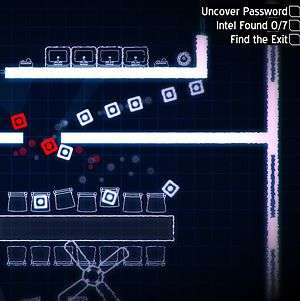 The soundtrack consists of pleasant enough electronic music, and while there’s nothing that particularly stands out, it fits well with the sci-fi theme and feels suitably tense as you stalk the corridors and hide behind desk chairs. The sound design as a whole complements the experience well, never upstaging any other aspect and aiding the game in delivering an exciting atmosphere.
The soundtrack consists of pleasant enough electronic music, and while there’s nothing that particularly stands out, it fits well with the sci-fi theme and feels suitably tense as you stalk the corridors and hide behind desk chairs. The sound design as a whole complements the experience well, never upstaging any other aspect and aiding the game in delivering an exciting atmosphere.
Overall, Light is an interesting stealth game with many good ideas and a lovely minimal art style, but the issues with the story cannot be overlooked and, with such a short playtime, it never has a chance to really get going. With some better writing and more levels, or even scrapping the story altogether in favour of pure stealth action ‘just for fun’, it could have been a truly great 2D stealth title. As it stands, however, it’s an interesting idea that just can’t decide what it wants to be, and ends up stuttering along as a result.
Pros- Fun and tense gameplay
- Lovely, simple art style
- Handles wonderfully
- Intrusive and bland story
- Over far too quickly
While the original Kickstarter may have sounded slightly too ambitious, it was more exciting than what Light actually became. It's still a decent stealth game, relying on good planning and timing to get the most out of it, accompanied by some beautiful, if basic, graphics. But, by trying to force a dull plot onto the player, the developers have shot themselves in the foot and detracted from what makes the game really enjoyable. Take away the story and you've got a really quite exciting stealth game, but it's too hard to ignore and ends up making the whole thing a confused mess.
Last five articles by Ric
- Playing Rhiannon, With Rhiannon
- The Hidden Controversies of 2015
- Best of 2015: Tell No Tales
- Best of 2015: A Good Walk Spoiled By John
- Best of 2015: My Summer As A Drug Dealer

















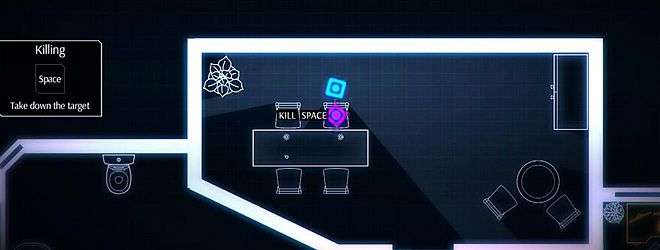
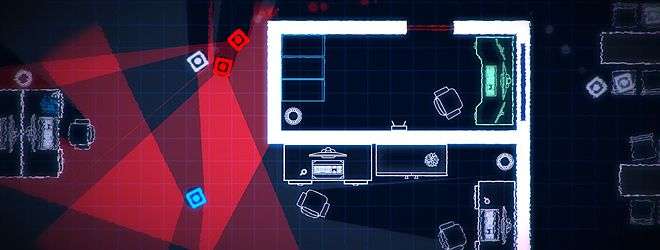
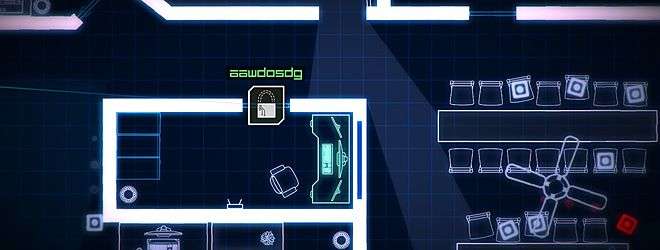






There are no comments, yet.
Why don’t you be the first? Come on, you know you want to!